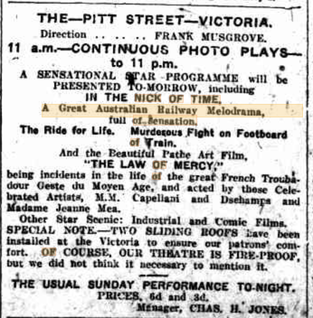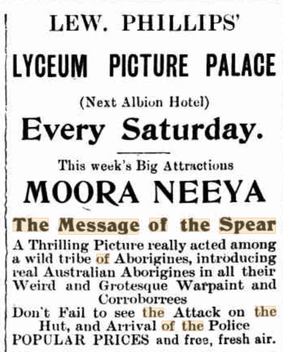Related Research Articles

Alfred Rolfe, real name Alfred Roker, was an Australian stage and film director and actor, best known for being the son-in-law of the celebrated actor-manager Alfred Dampier, with whom he appeared frequently on stage, and for his prolific output as a director during Australia's silent era, including Captain Midnight, the Bush King (1911), Captain Starlight, or Gentleman of the Road (1911) and The Hero of the Dardanelles (1915). Only one of his films as director survives today.

Captain Midnight, the Bush King is a 1911 Australian silent Western film about the fictitious bushranger Captain Midnight. It was the directorial debut of actor Alfred Rolfe. The film is based on the play of same name by W. J. Lincoln and Alfred Dampier. Captain Midnight, the Bush King is now considered lost.

The Lady Outlaw is a 1911 Australian silent film set in Van Diemen's Land during convict days.

In the Nick of Time is a 1911 Australian silent film directed by Alfred Rolfe. It was described as a "sensational railway drama", although now is considered a lost film.
What Women Suffer is a 1911 Australian silent film directed by Alfred Rolfe. It is a Victorian melodrama, complete with a climax where a little child is placed on a moving saw bench and is considered a lost film.
The Cup Winner is a 1911 Australian silent film directed by Alfred Rolfe. It is set against a backdrop of horseracing and the finale involves real footage from the 1911 Melbourne Cup.
Caloola, or The Adventures of a Jackeroo is a 1911 Australian silent film directed by Alfred Rolfe based on a novel published the previous year by Clement Pratt.
The Miner's Curse, or the Bush Wedding is a 1911 Australian silent film directed by Alfred Rolfe set during the Australian Gold Rush.
King of the Coiners is a 1912 Australian silent film directed by Alfred Rolfe. It is considered a lost film.
Do Men Love Women? is a 1912 Australian silent film directed by Alfred Rolfe about an alcoholic who reforms through the love of a good woman. The finale featured a railway collision.
The Sin of a Woman is a 1912 Australian silent film directed by Alfred Rolfe.
Cooee and the Echo is a 1912 Australian silent film directed by Alfred Rolfe. It is considered a lost film.
The Love Tyrant is a 1912 Australian silent film directed by Alfred Rolfe. It was described as an "Australian drama about the back blocks" and a "stirring drama full of thrilling incidents". It was set during the early bushranging days.
The Cheat is a 1912 Australian silent film directed by Alfred Rolfe. It is considered a lost film.
Won on the Post is a 1912 Australian silent film directed by Alfred Rolfe set against a backdrop of horseracing.
Whose Was the Hand? is a 1912 Australian silent film directed by Alfred Rolfe. It is considered a lost film.

The Loyal Rebel is a 1915 Australian silent film directed by Alfred Rolfe set against the background of the Eureka Rebellion.

Dan Morgan is a 1911 Australian film from Charles Cozens Spencer about the bushranger Daniel Morgan. It was said to be starring "Alfred Rolfe and company". Rolfe directed three movies for Spencer, all starring himself and his wife Lily Dampier so there is a chance he may have directed this one and that it starred his wife. A prospectus for the Australian Photo Play Company said he directed it. It is considered a lost film.
The Australian Photo-Play Company was a short-lived but highly productive Australian film production company which operated from 1911 to 1912.

Moora Neeya, or the Message of the Spear is a 1911 Australian silent film which was the first Australian movie to emphasise aboriginal people or "the first full Australian aboriginal drama yet produced."
References
- ↑ "Advertising". The Referee . Sydney: National Library of Australia. 14 August 1912. p. 16. Retrieved 14 September 2013.
- ↑ "Advertising". The Referee . Sydney: National Library of Australia. 4 September 1912. p. 16. Retrieved 14 September 2013.
- ↑ "WORLD-IN-MOTION". The Barrier Miner . Broken Hill, NSW: National Library of Australia. 7 December 1912. p. 5. Retrieved 29 March 2012.
- ↑ Andrew Pike and Ross Cooper, Australian Film 1900–1977: A Guide to Feature Film Production, Melbourne: Oxford University Press, 1998, p 35
- ↑ Vagg, S., & Reynaud, D. (2016). Alfred Rolfe: Forgotten pioneer Australian film director. Studies in Australasian Cinema, 10(2),184-198. doi:10.1080/17503175.2016.1170950
- ↑ "CENTRAL PICTURES". Daily Herald . Adelaide: National Library of Australia. 19 December 1912. p. 2. Retrieved 7 June 2015.
- ↑ "Advertising". The Sun . No. 494. New South Wales, Australia. 15 September 1912. p. 3. Retrieved 5 February 2024– via National Library of Australia.
- ↑ "AMUSEMENTS". The Advertiser . Adelaide: National Library of Australia. 5 December 1912. p. 13. Retrieved 29 March 2012.